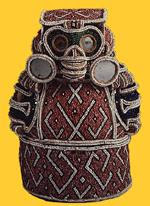UCTP Taino News - If you missed the "Untold Origins: Caribbean heritage and identity" exhibition, which was presented in London, England from October 19 2004 – February 26 2005, you can now download information from the exhibition by visiting the Cuming Museum website.
The exhibition presented "histories and stories of the people who populated the Caribbean prior to the arrival of Europeans 500 years ago" and highlighted Caribbean indigenous survival. Exhibition related educational materials can now be downloaded in pdf format if you have "Acrobat Reader". The Acrobat Reader program can be downloaded free via the internet at:
The exhibition presented "histories and stories of the people who populated the Caribbean prior to the arrival of Europeans 500 years ago" and highlighted Caribbean indigenous survival. Exhibition related educational materials can now be downloaded in pdf format if you have "Acrobat Reader". The Acrobat Reader program can be downloaded free via the internet at:
http://www.adobe.com/uk/products/reader/
--------------------
Excerpt from Cuming Museum Website:
Untold Origins - Caribbean heritage and identity
October 19 2004 to February 26 2005
The Untold Origins exhibition was presented for Black History Month 2004. It explored the untold history of the indigenous people of the Caribbean and their contribution to the Caribbean culture of today.
The Caribbean has always seen people on the move, from the settlement of people from the South American mainland thousands of years ago, the forced settlement of enslaved people from Africa, to the "island hopping" and emigration abroad in search of work in the 20th century.
Within the Untold Origins exhibition the Cuming Museum explored what happens when people and cultures move and come into contact with each other. What do people preserve from their original culture to maintain their sense of identity? How does contact with a new culture change how they view themselves.
The histories and stories of the people who populated the Caribbean prior to the arrival of Europeans 500 years ago seemed hidden. Until recently the received history of the Caribbean taught in schools repeated the inaccurate and simplistic story of Carib cannibals eating their way up the island chain, terrorising the more civilised Arawak communities. The indigenous people had been represented as being exterminated after European contact, with tiny populations of survivors on a few islands.
The indigenous cultures did experience a catastrophic collapse and the populations on some islands were nearly wiped out altogether. But at the same time as official colonial documents declared the native peoples as extinct they were finding ways to survive on the margins of society. The Cuming Museum wanted to explore their survival in more depth and to discover whether there are any echoes of indigenous culture surviving in Southwark's Caribbean culture today.
--------------------
Excerpt from Cuming Museum Website:
Untold Origins - Caribbean heritage and identity
October 19 2004 to February 26 2005
The Untold Origins exhibition was presented for Black History Month 2004. It explored the untold history of the indigenous people of the Caribbean and their contribution to the Caribbean culture of today.
The Caribbean has always seen people on the move, from the settlement of people from the South American mainland thousands of years ago, the forced settlement of enslaved people from Africa, to the "island hopping" and emigration abroad in search of work in the 20th century.
Within the Untold Origins exhibition the Cuming Museum explored what happens when people and cultures move and come into contact with each other. What do people preserve from their original culture to maintain their sense of identity? How does contact with a new culture change how they view themselves.
The histories and stories of the people who populated the Caribbean prior to the arrival of Europeans 500 years ago seemed hidden. Until recently the received history of the Caribbean taught in schools repeated the inaccurate and simplistic story of Carib cannibals eating their way up the island chain, terrorising the more civilised Arawak communities. The indigenous people had been represented as being exterminated after European contact, with tiny populations of survivors on a few islands.
The indigenous cultures did experience a catastrophic collapse and the populations on some islands were nearly wiped out altogether. But at the same time as official colonial documents declared the native peoples as extinct they were finding ways to survive on the margins of society. The Cuming Museum wanted to explore their survival in more depth and to discover whether there are any echoes of indigenous culture surviving in Southwark's Caribbean culture today.










No comments:
Post a Comment